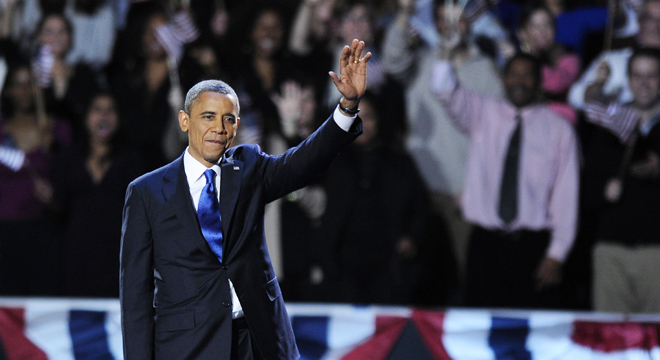Guns. Immigration. Climate Change.
It may not be what Democrats expected to be the White House’s plan in November, but President Obama has repeatedly identified each of these areas as critical parts of his agenda since winning re-election. In addition to his upcoming skirmishes with Republican lawmakers over taxes and entitlements, Obama’s second term could end up being defined by his success or failures on these three domestic policy fronts. As Obama learned after sinking a year into health care reform, it’s easy to get bogged down fighting for just one major item at the expense of the rest, raising the stakes for getting it right across the board.
Climate Change
Environmental policy didn’t get much attention during the campaign — it took an MTV interview to get Obama talking about climate change after three debate moderators failed to bring it up — but the president has since signaled that he plans on making it a top cause.
The question is what Obama can do on the issue given that the House’s top ranking Science Committee members are still not sold on evolution, let alone climate change. This isn’t a new problem: Obama couldn’t even get a cap and trade bill to his desk when Democrats had big majorities in both chambers of Congress. Instead he focused on regulations that could bypass Congress — for example, improved fuel efficiency standards for cars and trucks.
“In the President’s first term the administration has already taken historic action including proposing the first national standard for harmful carbon pollution from new power plants, as well as establishing unprecedented standards for cars and trucks that will slash emissions of carbon pollution while, at the same time, saving consumers billions of dollars at the pump,” White House spokesman Clark Stevens told TPM in an e-mail. “The President has made clear that his administration will continue to build on this progress and climate change will be a priority in his second term.”
The big action this time around is likely on power plants. New carbon emissions standards on future power plants are already making their way through the regulatory process. Obama’s best shot at reducing emissions further without Congress’ help is to finish up those rules and then add new standards to power plants that have already been built.
“Existing power plants are the single largest uncontrolled source of carbon pollution in the United States — they’re responsible for 40% of all carbon pollution in America,” Daniel J. Weiss, director of climate strategy at the Center for American Progress, told TPM. According to Weiss, if Obama regulates these plants and locks in his first term’s progress on curbing emissions, the US should be able to meet its pledge to cut carbon emissions by 17% below 2005 levels before 2020.
And then there’s the defensive end, which includes standing firm against any congressional efforts to weaken the administration’s regulatory power or cut subsidies to renewable energy.
Guns
Gun control was on nobody’s radar during the presidential election, but it promises to be Obama’s first big battle with Congress as soon as the inauguration partying is over.
On Wednesday, Obama outlined a long list of proposals to crack down on gun violence and all of the most significant ones require legislation. Gun safety advocates say they’re the real deal. Polls show majority support for renewing the assault weapons ban, limiting ammunition clip size, and especially for universal background checks on gun sales, but the NRA has stymied plenty of past attempts at gun control and the House GOP is unlikely to act unless it thinks its majority is genuinely threatened.
With chances of passage difficult, Obama and his allies may be gearing up for the long haul. Gun control groups are talking about using the coming battle to build a grassroots following that can take on the NRA. Former White House press secretary Robert Gibbs has suggested using Obama’s 2012 campaign apparatus to help make politicians pay for opposing reforms. If Democrats decide to adopt gun laws as a rallying cry in the midterm elections, Obama could end up devoting a large chunk of his second term to the issue.
Immigration
After failing to get immigration reform off the ground in his first term, Obama is planning an all-out push to pass a comprehensive bill within months.
Unlike climate change and guns, this is an issue where he might be able to garner some Republican support. A group of eight Republican and Democratic senators are currently hammering out a bipartisan bill that’s likely to include a path to citizenship for undocumented immigrants, a new system for bringing in low-wage workers, an expansion of visas for high-tech jobs, and a crackdown on employers who hire undocumented workers. Already Sen. Marco Rubio (R-FL) and Rep. Paul Ryan (R-WI), two of the biggest national names in the party, have signaled their support for a framework that sounds very similar to Obama’s.
While national GOP leaders are eager to pass a bill in order to help woo Latino voters, the House and its unpredictable and ultra-conservative Republican majority could be a heavy lift. Speaker John Boehner (R-OH), who has shown little ability to control his members so far, could be reluctant to antagonize the tea party wing further with an immigration bill many of them are likely to oppose out of hand — especially after what will likely be a difficult vote to raise the debt ceiling.
The best news Obama has going for him is that the issue has had long enough to simmer that it’s developed a highly organized alliance of supporters. Latino groups, labor unions, religious institutions, and business groups, are all planning campaigns in support of a reform bill. The opposition on the other is far less organized and well-funded, but a protracted fight could spark a grassroots uprising among the GOP base strong enough to keep its lawmakers in line.






